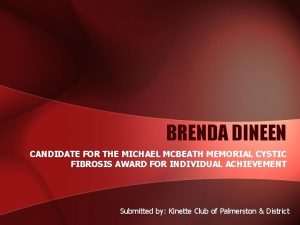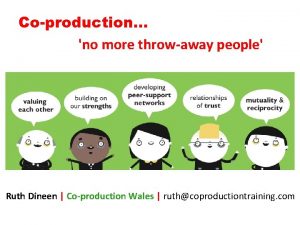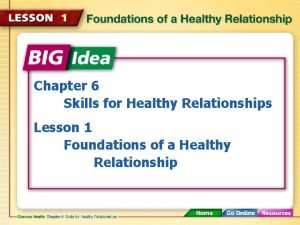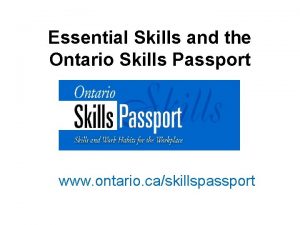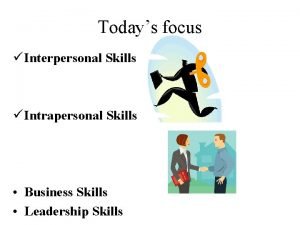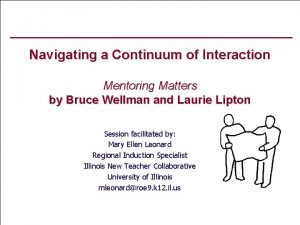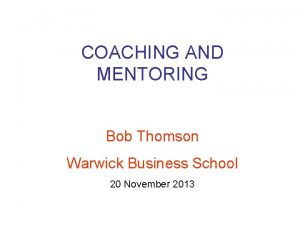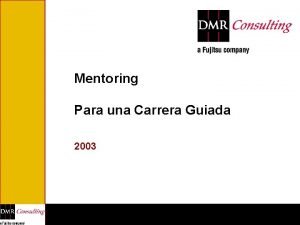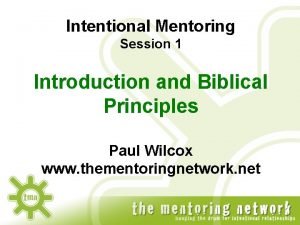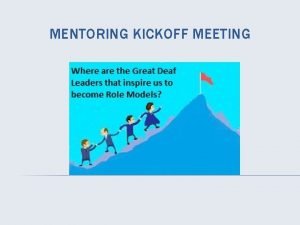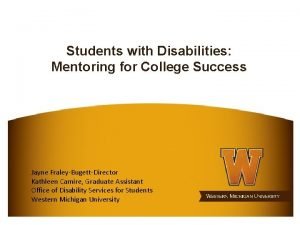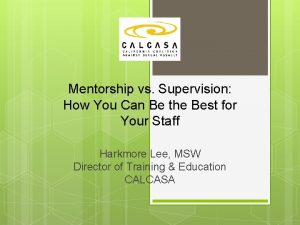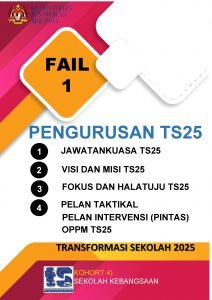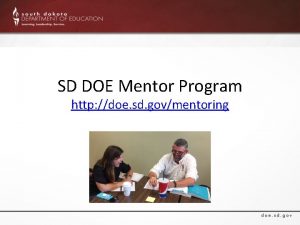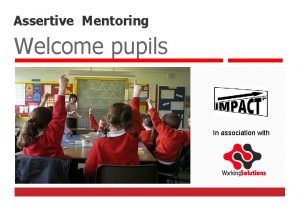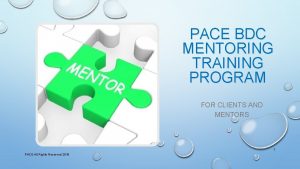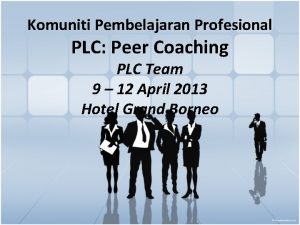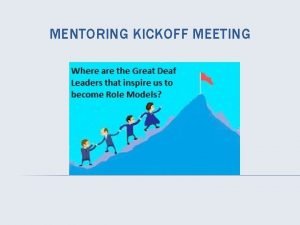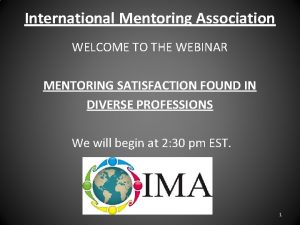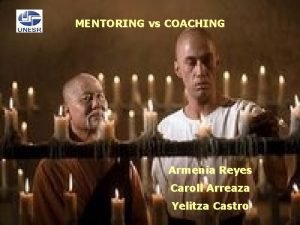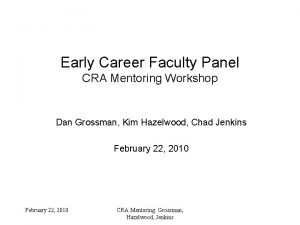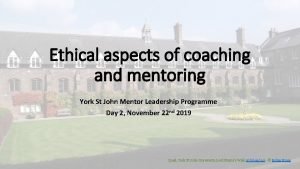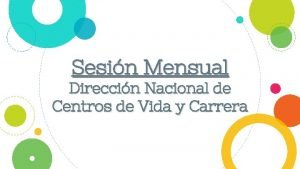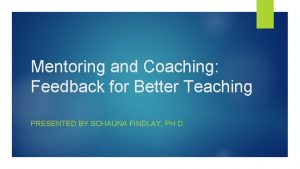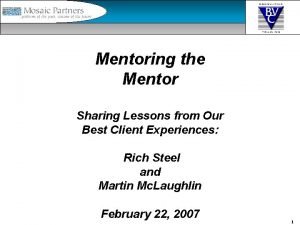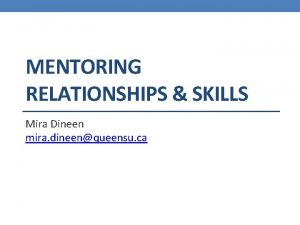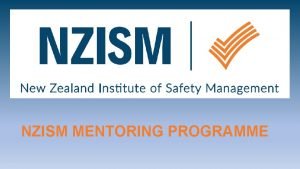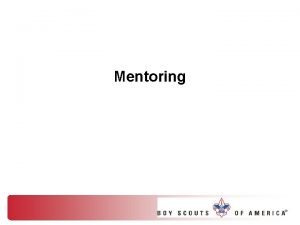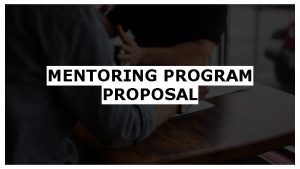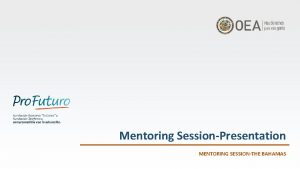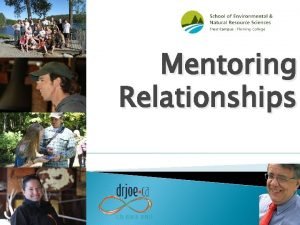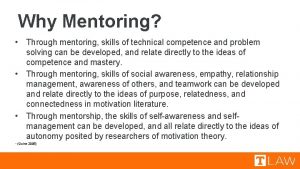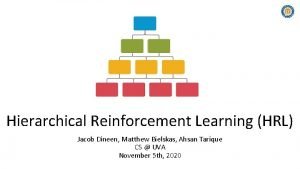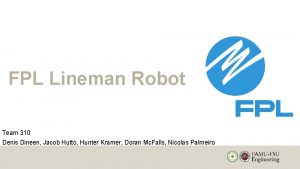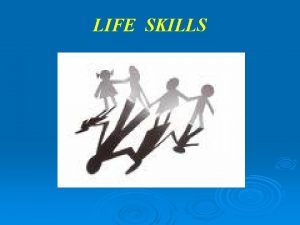MENTORING RELATIONSHIPS SKILLS Mira Dineen mira dineenqueensu ca






































- Slides: 38

MENTORING RELATIONSHIPS & SKILLS Mira Dineen mira. dineen@queensu. ca

Agenda • Mentoring Relationships • Goals and Scope • Peer Mentor’s Role • Qualities of Effective Mentors • Mentoring Skills • Communication Skills • Building Trust and Rapport • Empathy • Vulnerability • Resources and Referrals

What is a Peer Mentor? • A mentor is defined as someone who is an experienced and trusted advisor. • A mentoring relationship is when someone forms a supportive, coaching relationship with someone else.

Program Logistics • 1 Mentor + 1 Mentee • Matched based on a combination of factors (personality, interests, Mentee’s goals, Peer Mentor’s strengths) • Weekly meetings (1 hour) on campus • Peer Mentors offer personal support and model or teach practical strategies (health habits, learning strategies) • Peer Mentors apply the Wise Choice Mentoring Model to help Mentee to set goals and solve problems

Mentoring Meetings • Mentoring meetings are the foundation of your relationship • Basic logistics: • Meet on campus, before 9 pm • Do not meet in places that serve alcohol • Choose a quiet place where you can focus and speak freely

Program Supervision • Mentoring meeting logs • Fill out after every mentoring meeting (within 3 days). Program Coordinator will send you the URL to complete online. • One-on-One meetings • Scheduled after your first 4 -5 mentoring meetings, OR as needed. The Program Coordinator is always available for consultation. • Small team meetings • Every month, Peer Mentors meet in small groups (5 -6) with a Senior Peer Mentor to talk about their mentoring relationships and to share strategies • Volunteer meetings and ongoing training • Full team meetings (all volunteers) scheduled each semester, along with ongoing training and professional development sessions

Peer Mentors offer… Personal Connection Empathy Active Listening Validation Acceptance without judgement • Avoids assumptions • • • Encouragement with healthy lifestyle choices (sleep, exercise, eating) Modelling effective learning strategies Modelling positive self-talk Foster motivation, hope

Goals of Mentoring We hope that Mentees… Experience a sense of connection, support, empathy Develop strategies to effectively manage their academics Develop strategies to effectively manage their health Receive validation and unconditional acceptance from a peer

“It’s the Mentee’s Journey” A Mentor joins their Mentee for a brief part of their journey Goal is to provide support, validation, and empathy through mentoring relationship + Help Mentee develop useful skills and strategies

Student Support Network How is a Peer Mentoring relationship different from other support networks? • • • Empathic ear Personal Support Practical strategies Resources Referrals • • • Love, intimacy Fun, casual humour Feedback Two-way relationship Physical affection (hugs, touch) Peer Mentor Family, Friends Advisors, Professionals Professor, TA, Tutor • Diagnosis • Counselling, therapy • Health support • Learning strategies • Academic advising • Tutoring • Content knowledge

What Makes a Good Mentor? Think about someone who has been a mentor to you. 1. What qualities or skills made them an effective mentor? 2. Why was their approach effective? 3. Think about their words, their listening skills, their tone of voice, their responses to you. Think on your own (2 minutes) Pair up and discuss (3 minutes) Share with the class

Mentoring Skills • Verbal communication Skills • Open-ended questions • Active listening • Reflection • Summarizing • Non-verbal communication skills • Empathy • Mirroring • Trust and Rapport • Communication Blocks

Communication Skills: OARS Model • The OARS Model can be used to remember key communication skills. • Does not have to be used in this particular order • O = Open-ended questions • A = Active listening • R = Reflection • S = Summarize

OARS - Open-Ended Questions • Helps Mentee explore events, feelings, and options for action • Encourages the Mentee to do most of the talking • Begin with words such as “How”, “What”, or phrases such as “Can you tell me more about…” • Avoid questions beginning with “why” – can make people feel defensive

OARS - Open-Ended Question Examples • How do you feel about that? • Would you like to talk about…? • Can you tell me more about…? • What have you tried in the past? • What have you thought of doing? • How do you see things changing? • What is one thing you think would be helpful to start with?

OARS – Active Listening Skills • Pay attention. • Make eye contact, nod your head, open body posture (arms uncrossed) • Ask questions to clarify as needed • “Just to make sure I understand…” • Affirming presence • Give the Mentee the message “I see you and hear you” • Your tone of voice, eye contact and body language can all be affirming • Validate their feelings “It’s normal and okay to feel this way”

OARS – Reflective Listening Reflect back what you think the Mentee is saying, or what you observe. For example: • It sounds like…[paraphrase] Is that right? • I hear you saying that…[paraphrase] Is that how you’re feeling? • Helps make sure that you understand what the Mentee is telling you • Mentee can hear what they have said, clarify, feel understood

OARS - Summarizing • Summarizing is a good way to organize thoughts and pull together key points. • Useful if a Mentee gets off track, when transitioning between topics, or at the end of a meeting. • End with an invitation for Mentee to respond • What did I miss? What else would be helpful today? What other questions do you have? • For example: • Today, we’ve talked about… • So you’ve mentioned…

Non-verbal Communication is more than just words. What else are you saying? Body Language Attending Behaviours • Facial expression • Eye contact • Posture • Nodding • Smiling • No fidgeting Your Voice • Tone of Voice • Speed of Speech

Practice Your Communication Skills • Partner 1: Talk about how your day or week has been going (i. e. , getting ready this morning) • Partner 2: Use the OARS model to listen to their story, and ask questions to understand. • Talk for 2 minutes, then switch • O = Open-ended questions • A = Active listening • R = Reflection • S = Summarize

Exercise Debrief Communicating is a skill! Growth is possible with self-reflection, being open to discomfort and learning, and feedback. It takes practice! • Self-reflection: • What aspect of the exercise was difficult for you? • Peer feedback: • Body language, attending behavior, and voice • Was the OARS model used? What worked? What didn’t? • Class feedback: • What was the exercise like? What did you learn?

Empathy • Brene Brown clip on Empathy (2: 54) https: //www. youtube. com/watch? v=1 Evwgu 369 Jw

Vulnerability as Key to Empathy “Empathy is a choice, and it’s a vulnerable choice. In order to connect with you, I have to connect with something in myself that knows that feeling. ” The Mentee shows vulnerability by opening up to their Peer Mentor shows vulnerability by being comfortable sitting with Mentee and feeling empathy for them.

Empathy and Communication Blocks • Dismissing - “You’ll be fine”, “That’s not a big deal” • Playing the expert - “I know exactly what you mean” • Preaching - “You should…”, “It is your responsibility to…” • Giving advice, fixing – “Why don’t you just do this? ” • Rationalizing or ‘explaining away’ - “You don’t really mean that”, “It doesn’t make sense to worry about that” • Assumptions – “You must be so excited!” How do these patterns block empathy and vulnerability? How would these ‘blocks’ make a Mentee feel? How do these ‘blocks’ serve the Mentor?

Practicing Empathy and Vulnerability Personal Visualization Exercise 1. Think about a time where you experienced a personal struggle. 2. How did you feel physically? How did you feel emotionally? What were your thoughts or inner dialogue (self-talk) like? Share with a partner. Partner listens without responding verbally.

Building Trust and Rapport What are some things you can do to build trust and rapport? • Break the ice with small talk • Share some personal information about yourself • Find some shared experiences • Good communication skills (OARS, non-verbal) • Listen with an aim of understanding • Show empathy • Use humour. Laughing together can create harmony and connection. • Be patient – trust takes time!

“Mirroring” • Mirroring is when someone reflects the gesture, speech pattern, or attitude of another • Can help with building rapport and showing empathy

Self-Disclosure • Self-disclosure is when you share information about yourself or your own experiences with your Mentee • One way to build trust and rapport, show empathy • TIPS • Keep it brief… focus on the Mentee • Use it only when it is helpful • Remember that not everyone’s experiences are the same • Say something like “Everyone’s experiences are unique and my situation isn’t exactly the same as yours, but I think I can relate to that feeling of disappointment…”

Recap • Be mindful of the opportunities and limitations of a Peer Mentor’s role. • Practice good communication skills (OARS) • Listen to understand • Choose empathy • Accept without judgement • Avoid assumptions • Be comfortable with silence • Self-reflect regularly • Be yourself!

One Thing I Learned

Next Steps • Training sessions (Wise Choice Mentoring Model, etc. ) • Peer Mentors submit matching form at the end of training • Program Coordinator meets with Mentee (intake meeting) • Program Coordinator matches Mentee to Peer Mentor • Match meeting • First mentoring meeting • See handouts: • First Mentoring Meeting Guidelines • Peer Mentor Cheat Sheet • Peer Mentor Matching Form

RESOURCES AND REFERRALS Mira Dineen mira. dineen@queensu. ca

Resources and Referrals Sometimes, the needs of your Mentee may be beyond your scope as a Peer Mentor or beyond your abilities at the time. In these cases, you may need to refer them to another resource. Think back to the Student Support Network diagram. When would a referral be appropriate or necessary? •

Steps to Effective Referrals Sometimes, the needs of your Mentee may be beyond your scope as a Peer Mentor or beyond your abilities at the time. In these cases, you may need to refer them to another resource. Approach Educate, Encourage Refer

Step 1: Approach • Demonstrated a calm, caring, concerned, genuine interest in helping • Identify behaviour or signs – don’t diagnose/label “You’ve mentioned that your breakup has really affected you and that you aren’t coping well. I care and I’m concerned. ”

Step 2: Education and Encourage • Explain the reason for the referral (e. g. “I’m not the best person to help you with this. ” • Present the resource in positive way, share information “I think a counsellor could offer better support in this area. You can get counselling at HCDS or through Good 2 Talk, a counselling phone line. Would you consider using either of these resources? ”

Step 3: Refer • Give Mentee contact information for resource • Offer to call/email the resource together • Can offer to walk Mentee to resource, if on campus Remember, It’s up to the Mentee! Respect their decision and keep communication open.

Questions?
 Brenda dineen
Brenda dineen Karen dineen wagner
Karen dineen wagner Ruth dineen
Ruth dineen Kyler dineen
Kyler dineen Chapter 6 skills for healthy relationships lesson 1
Chapter 6 skills for healthy relationships lesson 1 Define the relationship ch 6
Define the relationship ch 6 Soft skills definition
Soft skills definition Ontario skills passport essential skills
Ontario skills passport essential skills Intrapersonal skills example
Intrapersonal skills example Coaching mentoring continuum
Coaching mentoring continuum Hdn mentoring programme
Hdn mentoring programme Warwick mentoring scheme
Warwick mentoring scheme Beza coaching dan mentoring
Beza coaching dan mentoring Mentoring de carrera
Mentoring de carrera Cross-company mentoring
Cross-company mentoring Peranan coach dalam video how coaching works
Peranan coach dalam video how coaching works Ciri-ciri mentoring
Ciri-ciri mentoring Biblical mentoring principles
Biblical mentoring principles Www.flourishkh.com
Www.flourishkh.com Grow mentoring
Grow mentoring Mentor mentee meeting agenda
Mentor mentee meeting agenda Mentoring for success wmu
Mentoring for success wmu Mentoring vs coaching vs supervision
Mentoring vs coaching vs supervision Ts 25 kohort 6
Ts 25 kohort 6 Sd doe
Sd doe Assertive mentoring
Assertive mentoring Bdc training program
Bdc training program Plc coaching and mentoring
Plc coaching and mentoring Mentorship kickoff meeting
Mentorship kickoff meeting Britta jost
Britta jost International mentoring association
International mentoring association Similitudes y diferencias de mentor
Similitudes y diferencias de mentor Perbedaan coaching mentoring dan konseling
Perbedaan coaching mentoring dan konseling Cra career mentoring workshop
Cra career mentoring workshop Ethics in coaching and mentoring
Ethics in coaching and mentoring Mentoring exatec
Mentoring exatec Sample coaching and mentoring program for teachers
Sample coaching and mentoring program for teachers Mentoring topics
Mentoring topics Fracture treatment mentoring
Fracture treatment mentoring
